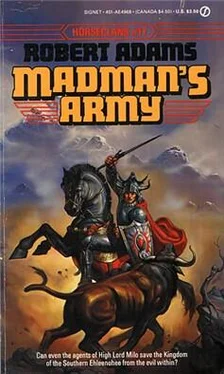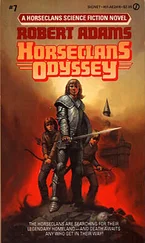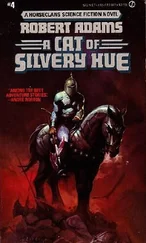“Where did you go when you left us there in central Kansas?” Milo demanded. “Most of the people who had been yours finally decided that you had felt death approaching and either had ridden off to die alone or to die near to the grave of your wife.”
“It surprises me that you remember so much and so clearly from so very long ago, my friend,” said Laskos-Bookerman, taking a seat, still cradling his brandy goblet. “My own recall is no longer so good; too many, many newer memories superimposed over the older ones must tend to cloud them, block them, make them of difficulty to drag up from the depths into which they have been pushed and immured.
“I cannot remember just where I went after I left you and those would-be nomads. I do remember that at some time during that period I dwelt for a long time alone in a well-preserved, well-stocked and still eminently livable complex I found carved into a mountain, out there in the Rockies. So long did I there remain that all of my beasts either died of old age or wandered off, and when to move on and find the humans for whose living companionship I hungered I did, it had to be on foot until at last I was able to acquire a scrubby little mount.
“Across the continent, slowly I wandered for years, seeing the natural increase of the survivors of near extirpation, Milo, and also observing the genesis of new societies, civilizations, cultures arising, phoenix-like, out of the dust and ashes of the old. Then, at last, I arrived upon the shore of the Atlantic Ocean. Through great good fortune, the rare kindness of fickle fate, I found a beautiful and incredibly well-preserved miniature version of a sleek ocean-racing boat. She was so beautifully designed and fitted that but a single man, if knowledgeable and active and strong, could easily sail her. In addition to her sails, she was equipped with an auxiliary diesel engine, one of sufficient power to give her decent headway in almost any circumstance.
“I now disrecall what her previous owner had called her, but I rechristened her Woge Stute after I had completely refurbished her for a long voyage. I cherished a desire to once more, after so very many long years, see again my Heimat , the land of my long-ago birth, and I had faith that this fine, friendly vessel would safely bear me to my longed-for destination.
“Of course, in those times, it took me actual years to hunt out or make all that was needful, but then the one thing for which our rare kind never lacks is time. Nicht wahr ? Let it suffice to say that at last I felt everything to be in readiness and I put my treasure of a boat back into the water. But of course, contemplating a voyage of such length, the mere fact that she floated and seemed sound could not be enough, so I undertook several trial voyages of lesser and greater distances, each of them teaching and reteaching me things which I had forgotten over the years and centuries I had been almost landbound.
“Finally, on a late-April day, I left the coast of what had once been called the State of Maine behind me and pointed my darling’s prow northeast, toward the continent of Europe. At last I was bound for heiligen Deutschland, mein Heimatland .”
“My God, Clarence,” exclaimed Milo, “weren’t you at least daunted to consider such a risk? You can drown, you know. My original coruler of Kehnooryos Ehlahs, Demetrios, died in just that way some years back; was pushed off a bridge in the middle of a battle, in full armor, and with a death-wounded war-horse on top of him, to boot. We found his helm on the bed of the river and nearby a cracked skull that might or might not’ve been his, too. But no man has ever seen or heard of him, since.”
“Naturally, I was afraid, Milo,” replied the guest, “just as I was always afraid when the air raids took place during the Second World War, in Berlin. There is at least that much of true, normal humanity in my makeup. But just as beasts and birds and eels and salmon must return to their natal grounds or waters, regardless of obstacles or distances or swarming predators, I was consumed with an irresistible urge to once more see as many of the sights of my ancient youth as still remained in the hills and deep, silent valleys and dark forests that nurtured me of old. Cannot you understand that, my old friend, Milo?”
The High Lord of the Confederation of Eastern Peoples sighed. “Of course I do, Clarence. I know the feeling, believe me. Although I’ve never been able to remember any of my life prior to about 1937 A.D., still do I often desire to return to places where once I was happy for some years. For instance, although I have been only something like a century removed from the plains and prairies, I often must suppress an itching urge to just saddle a horse and ride west until I once more am where I lived for so very long. So, yes, I do understand, fully, just what drove you to take such hellish risks on the open sea, alone.”
“It was a terrible voyage, Milo,” said Bookerman-Laskos. “I had, I discovered, chosen a bad time of year for that northerly route, for it was spawning-time for icebergs. After not a few very near-disasters, I reset my course farther south, only to suffer through storm after storm, raising waves that often overtopped my masthead and cost me much of my precious diesel fuel to maintain headway and to keep the bilge pumps going that I not be swamped.
“Those storms it was drove me so far south that my first landfall was not Ireland or England as I had expected but, rather, France, in the Bay of Biscay I was standing in to some tiny, nameless Gascon port, when three craft about the size of whaleboats came rowing out toward me, fast as the crews could row.
“Some sixth or seventh sense gave me warning, and I fixed my set of big binoculars upon those boats while still they were fairly far distant. What I saw through the glasses was not at all reassuring to a sea-weary mariner. All of the men were armed to the teeth, though mostly with a vast assortment of edge-weapons. Nor were their physical appearances an improvement— all looking to be hairy, dirty and most brutish, though strong. So I threw over the rudder and retrimmed the sails, determined to put as many nautical miles as was possible between me and such an aggregation, and I was doing just that when, abruptly, the wind died to almost nothing and, with a hoarse, bellowing chorus of triumph, the rowers came onward, increasing their already-fast beat.
“That was when I repaired briefly belowdeck and returned with my Mannlicher rifle and its carefully hoarded store of cartridges, a Maschinenpistole for closer-range work, and two pistols, a saber and a hefty dirk for hand-to-hand, if it came to that.
“I was lucky enough to drop all three steersmen with five shots of the rifle. The next five dropped two replacement steersmen and two oarsmen, these last from out the lead boat, but the boat with still a steersman came on nonetheless, despite my deadly marksmanship, until it was less than twenty-five meters distant. At that, I laid aside the Mannlicher, took up the Automatisch and slew them all—rowers, steersman and passengers, alike. At the sound of the weapon, the sight of what I had done to the men in the lead boat, the other two swung about as one and rowed back toward their distant port at some speed.
“I kept watch lest they return until, just a little before sunset, I was blessed with a fresh breeze and was able to sail far upon it before heaving out the anchors and going below for badly needed sleep.
“While searching for other things, mostly things of a nautical nature in Maine, I had lucked across a store of smokeless powders, primers and even some boxes of unprimed brass cases and factory-cast bullets in the exact caliber of my Mannlicher—8 x 57mm. In late morning of the next day, once more becalmed off the southern coast of Brittany, I was engaged in reloading the rifle cartridges that I had had to fire at the Gascons when I once more heard the distinctive creak and thump of oarlocks approaching.
Читать дальше












